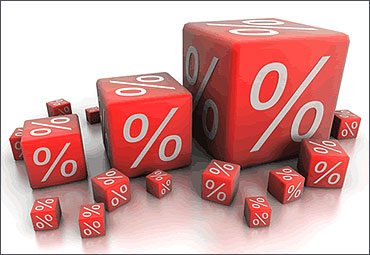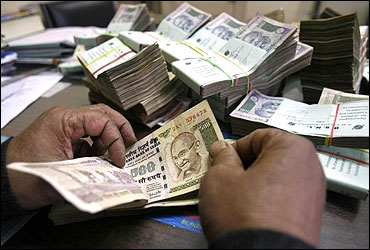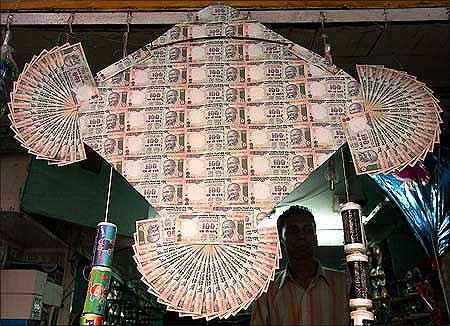Sandeep Shanbhag
When we plan to buy a house, most of us buy it on borrowed capital or loan.
The option is to use your own funds if you have enough savings or have saved specifically for this goal.
But, you may ask which of the two is better. While that is a difficult question to answer, it would largely depend on four variables.
- The amount of loan you want to take
- The interest rate you will have to repay on the loan
- The tenure for which you have borrowed from the financial institution
- And the interest that your own funds can generate
For Rediff Realtime News On February 28 National Strike, . . .
Take a loan, don't drain savings
Each of the above mentioned figure is critical and will affect the analysis significantly.
For instance, the total amount of loan and the prevailing interest rate will obviously determine the equated monthly instalments you will have to pay and the loan tenure.
Any change in the EMI will affect the loan tenure and the EMI immediately.
Say you had taken a home loan in 2006-07 at 7-8 per cent, one you would be repaying at 13-14 per cent, today and you loan tenure (if you had taken a 20 year loan) would be 25-27 years.
At the same time, the return that your own funds can earn would in turn determine whether you should opt for a loan in the first place and if yes, how much.
For Rediff Realtime News On February 28 National Strike, . . .
Take a loan, don't drain savings
So, it is the interplay between these four variables that eventually leads us to the most optimal solution.
Vishal takes a housing loan of Rs 15 lakhs (Rs 1.5 million) for 15 years at the rate of 12 per cent a year, while his own funds generate a pre-tax rate of 10.5 per cent yearly.
Now, since Vishal is taking a loan of Rs 15 lakhs, it means his personal funds to that extent are available to be invested elsewhere which otherwise would not have happened. He falls in the 30.9 per cent tax bracket.
The post tax interest is available to him to fund the EMI.
For Rediff Realtime News On February 28 National Strike, . . .
Take a loan, don't drain savings
Basically, the analysis throws up whether Vishal should buy the house using his own funds or whether it would be better to invest his funds and use the interest from such investment to pay the EMI.
Taking the table into consideration, you will have to go through a bit of number crunching, and if you stay with it, the results will be interesting.
So let's get started.
The EMI on the loan is around Rs 2,20,000 annually.
Taking annual figures for simplicity, otherwise, EMIs are paid monthly.
The total interest paid out for the first year is Rs 180,000.
For Rediff Realtime News On February 28 National Strike, . . .
Take a loan, don't drain savings
The closing balance for the first year is Rs 15 lakhs less the capital repaid during the year.
Now coming to the second part of the table.
As already discussed, since Vishal's taken a loan of Rs 15 lakhs he can invest a similar amount of personal funds as he pleases.
Therefore, the interest received for the first year would be Rs 157,000.
He has to pay tax on this interest at 30.9 per cent or Rs 48,668.
The loan would give tax breaks to Vishal.
Tax saved on interest in the first year is Rs 46,350.
Similarly, the principal repayments are deductible under Section 80C up to Rs 100,000. In the first year, Vishal repays capital to the extent of Rs 40,236 thereby giving him a tax advantage of Rs 12,433.
Reduce the EMI payable from these figures and Vishal is left with a net closing balance of Rs 14.47 lakhs (Rs 1.44 million).
For Rediff Realtime News On February 28 National Strike, . . .
Take a loan, don't drain savings
The calculations for the rest of the years are worked out on similar lines as above and at the end of fifteen years, Vishal finds that he is the proud owner of not only a house but also a bank balance of Rs 2,11,000.
And this, after the EMIs.
To put it differently, had Vishal not opted for the loan but instead chosen to apply his own funds in the beginning itself, he would have ended up with only the house instead of a bank balance and the house.
Therefore, opting for the loan (on the above terms) has worked in favour of Vishal. I reiterate 'on the above terms'.
For Rediff Realtime News On February 28 National Strike, . . .
Take a loan, don't drain savings
In the spreadsheet analysing Vishal's loan, the variables were the loan amount, the tenure, the interest rate on the loan and also the interest rate earned on personal equity.
Any variation in any of these variables may alter the conclusion materially.
For example, let's say the interest on the loan amount goes up to 13 per cent.
In such a case, by taking the loan, Vishal would lose around Rs 71,000.
On the other hand, if Vishal can earn higher than 10.5 per cent on his own funds, he would be much better off than before.
So depending upon the numbers plugged in the spreadsheet, every potential homeowner can decide to what extent he should leverage himself.
For Rediff Realtime News On February 28 National Strike, Click Here
The writer is director, Wonderland Consultants









article